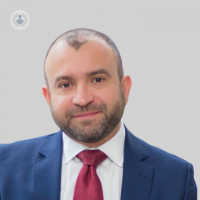Can throat problems affect the voice and breathing?
Written in association with:In one of our latest articles here below, highly experienced and qualified ENT specialist, Mr Mohiemen Anwar, discusses common throat problems, and reveals to what extent problems related to the throat can affect the voice and breathing.

What are the common throat problems?
Throat disorders are very common in adults and children. The term sore throat covers any abnormality of the throat, although it mainly refers to inflammation of the throat (pharyngitis),
Acute upper respiratory tract infection and inflammation of the pharynx as well as respiratory viruses (common cold viruses) are the most common causes of a sore throat. Those infections are usually self limiting and would require regular, simple analgesia and warm fluids, in addition to rest and time off work/school.
In the case of prolonged symptoms and a temperature of more than 38.5 C, there is a possibility of a more severe form of infection. Glandular fever can also lead to the development of throat problems.
What symptoms can bacterial tonsillitis cause?
Bacterial tonsillitis is a more severe form of a throat infection that can cause patients to have severe pain when swallowing, a change in voice, dehydration, and a high temperature. It is treated with antibiotics, either to be taken orally, or in more severe cases (due to an inability to swallow), the patient would be required to be admitted to the hospital for antibiotics via an intravenous (needle in the arm) route, in addition to receiving hydration via the same route.
Occasionally, the inflammation can spread to adjacent structures causing:
- Lymph node enlargements (reactive lymphadenopathy)
- Abscess formation between the tonsil and the soft palate
- Spread of infection into the deep parts of the neck, causing abscess formation
When would a tonsillectomy be required?
In case of repetitive or recurrent episodes of throat infections or tonsillitis, especially if any of the episodes has developed into one of the complications mentioned above, then your ENT specialist might discuss with you the possibility of removing your tonsils surgically with a common operation called a tonsillectomy.
Can throat problems affect the voice and breathing?
The pharynx is a common tube for both passing air from the nasal passages to the lungs via the larynx (voice box), and food from the mouth to the stomach via the oesophagus. So, throat disorders can cause issues with not only the voice and breathing, but also with swallowing and digestion.
Disorders with the larynx mainly cause changes in the voice, such as hoarseness, and to a lesser extent, difficulty breathing. Any difficulty in breathing is an emergency and patients should seek urgent medical attention.
How is hoarseness treated?
Hoarseness will need the attention of the ENT specialists who have the skills and the equipment needed to examine the pharynx and larynx via a special Fibre-Optic endoscope (special light and camera system). This endoscope is inserted via the nasal passages and passed via the back of the nose to view the pharynx and larynx. It is not a painful examination, although a degree of discomfort and strange sensation is expected, which is usually very well tolerated by patients.
Hoarseness caused by an abnormality of the voice box is commonly treated by ENT specialists jointly with speech and language therapists. For example, singers can develop what is referred to as Singer’s nodules or vocal cord nodules, commonly caused by overusing or abusing the voice, which rarely requires surgery, but more commonly treated with good voice hygiene and professional voice coaching by a specialist speech and language therapist.
To schedule in a consultation with Mr Mohiemen Anwar, just head on over to his Top Doctors profile today.


